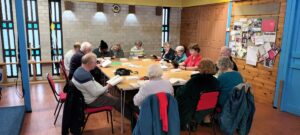 The fireworks have fizzed, the bangs have stopped, the dogs and cats have come out of hiding and we are well into the first day of the New Year – 2024. New Year resolutions are rolling around social media, with one website recommending the top 55 New Year Resolutions . In the lead is something very sensible. It says, ‘Focus on a passion, not the way you look.’ Long past worrying about the way I look, one of my Passions is encouraging people, especially God’s people, to think positively about their old age. For all of us, it should be up there with our top New Year’s resolutions!
The fireworks have fizzed, the bangs have stopped, the dogs and cats have come out of hiding and we are well into the first day of the New Year – 2024. New Year resolutions are rolling around social media, with one website recommending the top 55 New Year Resolutions . In the lead is something very sensible. It says, ‘Focus on a passion, not the way you look.’ Long past worrying about the way I look, one of my Passions is encouraging people, especially God’s people, to think positively about their old age. For all of us, it should be up there with our top New Year’s resolutions!
One thing for sure is that at the end of 2024 all of us will be a year older than we are now. There are now 3.2 million people aged 80 or over in England and Wales, and almost 600,000 of these are aged 90 and upwards.
Recently I read an article by a psychologist suggesting that we learn ‘distress tolerance’ when we find ourselves grieved by seeing those who are older starting to decline. ‘Decline’ is an ageist judgement. The apostle Paul didn’t link growing old to the notion of decline when he noted that our ‘earthly tent’ is decaying. We are much more than our physical bodies.
Only this week an email from a 91 year old retired missionary doctor asked if I knew where to get CDs with old songs from the past that people could listen to because music is good for the brain. CDs are not as popular now as down-loaded music, so this is a bit of a challenge! William has a ministry to older people (and anyone else God puts into his life); walks his little dog daily around his village using his rollator; records little ‘church’ talks for the website, and visits his wife three or four times daily in her care home. He’d cared for her for several years at home, until she needed more specialist care. He is living with spinal stenosis and a dodgy heart, but he is definitely not in decline. William’s passion from his youth has been sharing the Word and the goodness of God, and it’s as vibrant today as it was fifty years ago.
The big surprise is that how we feel about growing old determines our health in old age: literally, in many cases. ‘In the first study to determine how age beliefs impact our psychology, I found that positive age beliefs serve as a barrier against stress, whereas negative age beliefs amplify it,’ writes Professor Becca Levy, of Yale University, a world leader in the study of ageing. It’s an important finding, as chronic stress disposes to dementia and other diseases. In her new book, Breaking the Age Code, she demonstrates that many things about ageing that we assume are natural and inevitable, such as memory and hearing loss, and cardiovascular events, are in fact influenced by our own negative biases, often informed by cultural ageism. She tackles head on how we can shift these outdated ideas at a societal level and what we can do to help ourselves.
Tackling it at societal level is very tough. Western culture associates old age with words such as ‘decrepit’ or ‘deterioration’, whereas in Chinese and in Filipino culture they’ll use words like ‘wisdom’ or ‘insight’. In the Scriptures, God says it is ‘a crown of glory’. “Show respect to the aged; honour the presence of an elder; fear your God. I am God,’ says Leviticus 19:32.

When ageism was visibly affecting countries’ economies real steps were taken to change attitudes. After the Covid lock-down tens of thousands of older people added to business woes by taking early retirement, largely because of ageism at work. In New York educators started programmes with teenagers in High Schools, helping them dismantle myths and making connections between the discrimination they receive – such as not being treated seriously at work – and that experienced by older people. Ageing Commissioner Lorraine Cortez-Vasquez said that the goal of the program was to bring ‘the two bookends of our city, the youth and older adults together… in conversation’. Stansted University Psychology Professor Laura Carstensen agrees: she has found that as people age their brains actually improve in many ways, including in problem-solving and emotional skills. ‘It’s a huge loss not to offer these to younger people,’ she says.
I know many older people like William, whose lives have meaning, and purpose. Yes, their bodies may be stooped and they may have physical challenges, but they know their value to God: the ‘real them’ is growing from one degree of glory to another. One even wrote a book at 100 years of age so that his testimony would still be around, bringing people to faith. (It worked.)
How do you feel about your own old age? Check if you are harbouring ageist myths here: https://www.nia.nih.gov/health/healthy-aging/10-myths-about-aging














